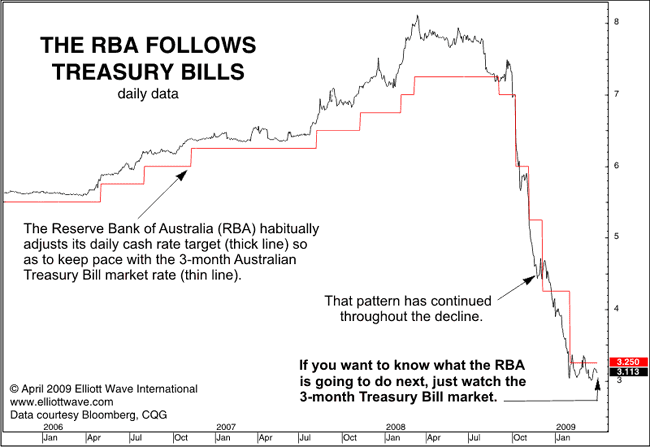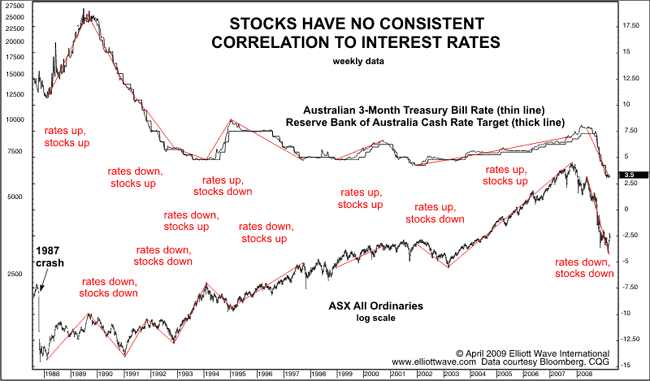Think That Central Banks Move the Markets? Think Again
Stock-Markets / Global Stock Markets Apr 23, 2009 - 12:16 PM GMTBy: EWI
 The following is excerpted from Elliott Wave International’s Global Market Perspective. The full 120-page publication, which features forecasts for every major world market, is available free until April 30. Visit Elliott Wave International to download it FREE.
The following is excerpted from Elliott Wave International’s Global Market Perspective. The full 120-page publication, which features forecasts for every major world market, is available free until April 30. Visit Elliott Wave International to download it FREE.
Conventional wisdom says that central banks can influence or even direct financial markets and the macroeconomy. The very existence of Elliott waves challenges such assumptions. For if markets responded to every central bank directive, how could Elliott waves exist? Parallel trend channels, Fibonacci price relationships, the similarity of form between waves of different sizes and time periods—none of that would be possible. Central bank decisions would have to coincide perfectly with turning points in Elliott waves, and we know that just doesn’t happen. But even without using waves, we can expose the conventional wisdom for the fallacy that it is.
Take, for example, this assertion in a recent article in a U.K. economic weekly: “Part of the aim of central banks in driving down interest rates is to encourage a greater risk appetite among investors.” Two key assumptions underlie that statement: a) central banks determine interest rates; and b) lower interest rates can increase society’s appetite for risk.
To see how the first assumption is false, let’s take a look at the daily chart of Australian interest rate data. It duplicates a study that Elliott Wave International has often done with U.S. interest rate data. It shows how movements in the cash target rate set by Australia’s central bank, the Reserve Bank of Australia (RBA), appear to follow those in 3-month Australian Treasury Bills. After decisive moves up in T-bills from 2006 to early 2008, for example, the RBA faithfully raised its target. T-bills have since led the RBA during the financial crisis of the past year. In fact, the record indicates that the RBA almost always follows T-bills over time.
The proper conclusion to draw is not that the RBA has orchestrated the decline in rates since the early 1980s—but that it’s been riding it. During good times, central bankers look like geniuses; during bad times, they get tarred and feathered. Closer to the truth is that their interest-rate decisions are not proactive, but reactive, and that they continually follow in the footsteps of the market for lack of any other useful guide.
Now let’s look at the second assumption: that lower interest rates increase society’s appetite for risk. A simple glance at the weekly chart shows this assumption to be false. After the 1987 crash, the ASX All Ordinaries actually rallied for two years on rising rates and then sold off through 1990 on falling rates. Stocks then rose in 1991 on continued falling rates and sold off in 1992 on even lower rates. Continue following the chart to the right and you will see that there is no consistent correlation between the direction of interest rates and that of the stock market.
The myth of central bank potency is so pervasive that conventional analysts can’t even imagine a better explanation for price trends: that the market is the dog wagging its central bank tail, not the other way around.
For more information, download Elliott Wave International’s FREE issue of Global Market Perspective, available until April 30. The 120-page publication covers every major world market, global interest rates, international currencies, metals, energy and more.
Mark Galasiewski is the editor of Elliott Wave International’s Asian Financial Forecast and member of EWI’s Global Market Perspective team covering Asian stock indexes.
© 2005-2022 http://www.MarketOracle.co.uk - The Market Oracle is a FREE Daily Financial Markets Analysis & Forecasting online publication.





